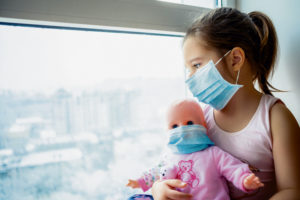We can often learn so much from asking the children in our lives about their thoughts and experiences. But when the world around us gets stressful, we sometimes forget to engage in those conversations. Last week, the Integrated Resilience Office invited dialogue with several community kiddos and we are thrilled to share their insights and advice on coping with COVID-19 and the transition back towards normal.
It is apparent that even the smallest among us have big opinions about the physical distancing measures that have been implemented to keep us safe. One 7-year-old named Gus noted that his daily routine now centers around, “just staying at home with Mom and doing computer.” When asked if he enjoyed this new normal, the answer was an unequivocal “No! Who would?!”
In line with Gus’s thoughts, all the children we spoke with were eager to get back to interacting with their friends. KJ, a local 11-year-old, insisted that it is important adults remember that dealing with physical distancing, “is even harder for kids than it is for grown-ups because grown-ups just work, but kids need to see their friends and play with people.”

Although the children we talked with noted a general distaste for physical distancing, each one noted the measures were important for keeping our community healthy and safe. It is imperative that even as the restrictions lift, community members, “stay home if they’re sick, cover their cough, and wash their hands a lot” (KJ, 11 years) and to “wait for the doctors to tell us”(Ruby, 11) what restrictions we should continue to follow.
Community children obviously have strong opinions on the current state of affairs and they also had important words of advice for even the adults among us. Andrew, 8, noted that it is important to stay active even while staying home, and he personally does this by, “running every day with Mom or Dad” which he plans to, “keep doing even after things go back to normal.”
The other large piece of advice was that so long as physical distancing measures are in place, we must make an effort to remain socially connected. Ruby, 11, noted that one way to stay connected to others is to build stronger relationships within your household, which she did and noted, “me and my brother are getting closer because we are the only friends we get to see and we’ve been fighting less and we have been connecting with each other more.” Emily, 13, recommends staying connected “Mainly by FaceTiming but if you can’t FaceTime then texting,” driving home the idea that maintaining contact with others is possible with technology.
As we turn our attention towards easing restrictions and returning to a sense of normalcy, Lena, 17, noted that, “this should be a slow process. It shouldn’t be something that is just dumped on people. Everything will feel back to normal when you go back to seeing familiar people, seeing your friends, and learning with them and then you will remember what you’re supposed to be doing.” Gus, 7, has plans to “go around hugging everyone on our street” once he is allowed to do so.
All the children noted that now is the time to begin transitioning our routines back towards normal. Emily, 13, noted that it is important to “slowly change times back to normal to hopefully make it easier” and suggests that others follow her lead.
In reflecting on the pandemic and thinking about the future ahead, all the children noted the importance of staying connected as a tool for remaining resilient. One tool we use to stay connected and strong at Ramstein is GRIT.
According to Lena, 17, the word grit means to have, “perseverance and the ability to move forward.” Ruby, 11, says that to be gritty means, “using your might to work hard on something.” KJ defines grit as the ability to, “stay together and be together through the hard times.” Gus said that we need to have grit so that we all “hold on to our rope and not fall off the edge” no matter what we face in life.
No doubt, we all need to be gritty during this time as we continue to cope with the effects of the pandemic and begin to turn our attention towards returning to normal. At the Integrated Resilience Office, we encourage the community to build strength through resilience by using the Operation GRIT program which promotes conversations about important topics in our workplace, as well as Ramstein’s sister program, GRIT365, which inspires conversations in our households and social lives. This month’s Operation Grit guide focuses on building Resilient Warriors and this week’s GRIT365 guide encourages taking time to engage in conversations with the children in our lives because we have so much to learn from them.
Indeed, we learned so much from taking the time to ask community children about their experiences, and we believe you will too! You can access Grit Resources on the Ramstein Air Base official webpage under resiliency tools (ramstein.af.mil/Resiliency-Tools) or by contacting the Ramstein Integrated Resilience Office at 86AW.CVB.IRO@us.af.mil.


